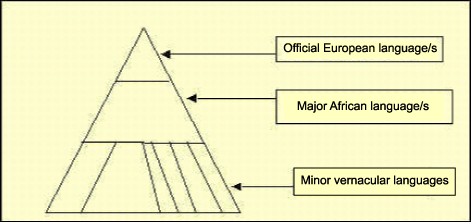
| Sociolingüística internacional |
| Overview of the Sociolinguistic Situation in Africa, by Marcel Diki-Kidiri | ||||
| CONTINUA |
On rare occasion, as in countries like Madagascar, Burundi, and Rwanda, there are only two levels to the linguistic pyramid. This is because the only indigenous language of the country (Malagasy, Kirundi, and Kinya-rwanda, respectively), has the function of major language, vernacular language, and also official language. However, the latter status places them in competition with French which is still the language of the elite in these three countries. We come across numerous varieties varieties like these when we take a closer look at the specific case of each country. 5. Modernization of African languages Modernization consists of enriching the languages, where necessary, with modern spelling systems, new terminology in the domains that are most lacking, pedagogical works for teaching, and finally the means for computer processing to allow them to face the current communication and informational needs, seen as necessary elements for the development of the people who speak them. 5.1. Spelling codification For most major African languages, the step from oral to written has been the first obstacle to overcome. After the most skilful linguistic descriptions have been carried out, the languages must be given a stable and practical spelling system with rules to standardize and regulate it. Fortunately, this territory has been crossed thanks, also, to numerous works by African linguists, especially from the International African Institute, with its multiple international conferences on the harmonization of African alphabets, since the Bamako 1066 conference that tried to harmonize the alphabets of Western Africa. In spite of the enthusiasm that this first conference sparked, it is evident that, with the backward movement, these aims have not been attained, because the different countries involved have continued to prefer their own codifications, often diverging in a single language or family of languages. However, the Bamako conference marked the consciences of politicians by making them more sensitive towards the need for a coherent language policy for the African languages. Since then, national seminars have been organized on the harmonization of the alphabets at least within the same country. These seminars have created reference alphabets, especially in Cameroon, Togo, Benin, Nigeria, Senegal, Mali, Democratic Republic of Congo, and stable alphabets for numerous major languages.It should be noted that many of these international conferences have been held on the initiative of UNESCO, which has also been one of the very few international organizations to propose an electronic version of the African alphabet, Alphafrique, whose distribution has unfortunately remained confidential. In fact, the African keyboard project that was proposed by Professor David Dalby, former director of the I.A.I., is still something new. From this you get the conversion to written language thanks to a codified and well-structured spelling system, but the problem is still far from being solved for the majority of the African languages, even though the major languages are all transcribed and better equipped than the others. 5.2. Lexicon enrichment As we are all aware, after colonization, the West barged in on the history of the African societies with a barrage of new realities: ways of thinking and lifestyles, the state and power structure, schools, medicines, currencies, industrial products, etc., history takes large steps and today’s African societies are more than ever Euro African bicultural societies. The African languages that had adapted very well to expressing the traditional world, suddenly found themselves in danger of being marginalized because it was mainly the European languages of the colonizers that occupied the upper part of the pyramid. Fortunately as the years have gone on, the successive failures of numerous development plans, that were concocted by experts, have little by little attracted attention to the urgent need to resort to the major African languages as a means of communicating modern reality, if we want to reach the population all the way down to the very last village for a long-lasting development. It is with this approach and with this aim that, in the context of an investigation that we conducted four years ago in the Langage, Langues et Cultures d’Afrique Noire (LLACAN) laboratory in Paris, we came up with a cultural theory of terminology that better adapts to the realities of developing countries. In the French-speaking context, the Intergovernmental Agency of the French-speaking has created and/or supported many programs and linguistic cooperation networks (Rint, Riofil, Rifal, Rilac, Rifm) (1) for the promotion and instrumentation of French and its partner languages, notably those from the countries of the south. It is within this framework that numerous works on terminology have been successful in a dozen countries of the south: Benin, Burundi, Cameroon, Guinea, Haiti, Madagascar, Mali, Morocco, Niger, Central African Republic, Democratic Republic of Congo, Senegal. In all of these countries, the terminology works on the major languages with specific status are carried out by national researchers working in local public institutions. International cooperation watches over the training of their researchers, provides computer equipment and specialized bibliographies for the institutions, helps to publish their research, and finds technical solutions to facilitate Internet access. The most recent project registered in the International French-speaking Linguistic Distribution Network (Rifal) deals with the implementation of terminology databases in certain countries of the south that have permanent and reliable access to the Internet since these databases should be able to exchange data with anyone else in the world. |
